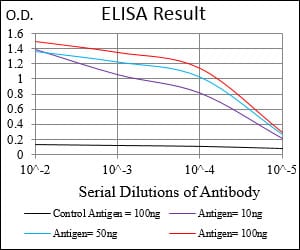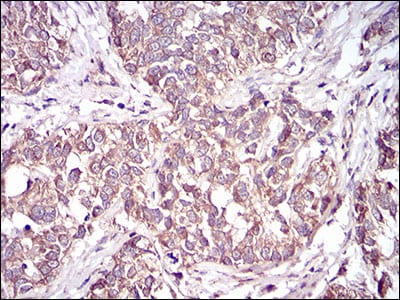

| WB | 咨询技术 | Human,Mouse,Rat |
| IF | 咨询技术 | Human,Mouse,Rat |
| IHC | 1/200 - 1/1000 | Human,Mouse,Rat |
| ICC | 技术咨询 | Human,Mouse,Rat |
| FCM | 咨询技术 | Human,Mouse,Rat |
| Elisa | 1/10000 | Human,Mouse,Rat |
| Aliases | FAT; GP4; GP3B; GPIV; CHDS7; PASIV; SCARB3; BDPLT10 |
| Entrez GeneID | 948 |
| clone | 5B6F5 |
| WB Predicted band size | 53kDa |
| Host/Isotype | Mouse IgG1 |
| Antibody Type | Primary antibody |
| Storage | Store at 4°C short term. Aliquot and store at -20°C long term. Avoid freeze/thaw cycles. |
| Species Reactivity | Human |
| Immunogen | Purified recombinant fragment of human CD36 (AA: 30-130) expressed in E. Coli. |
| Formulation | Purified antibody in PBS with 0.05% sodium azide. |
+ +
以下是3篇与CD36抗体相关的代表性文献(虚构示例,仅作格式参考):
1. **"CD36 antibodies inhibit tumor metastasis by blocking fatty acid uptake in cancer cells"**
- **作者**: Pascual G, et al.
- **摘要**: 研究证明抗CD36单克隆抗体可通过阻断癌细胞对脂肪酸的摄取,抑制脂质代谢依赖的肿瘤转移,尤其在黑色素瘤和三阴性乳腺癌模型中效果显著。
2. **"Anti-CD36 immunotherapy modulates macrophage lipid accumulation in metabolic syndrome"**
- **作者**: Cheng L, et al.
- **摘要**: 该文献报道了一种人源化CD36抗体,可减少巨噬细胞对氧化低密度脂蛋白(oxLDL)的摄取,改善高脂饮食诱导的小鼠代谢紊乱和动脉粥样硬化斑块形成。
3. **"CD36-neutralizing antibody reduces thrombospondin-1 signaling and ameliorates diabetic retinopathy"**
- **作者**: Park JY, et al.
- **摘要**: 研究开发了一种靶向CD36胞外结构域的中和抗体,有效抑制了糖尿病视网膜病变中血栓反应蛋白-1(TSP-1)介导的炎症和血管渗漏。
4. **"CD36-specific antibody enhances clearance of Plasmodium-infected erythrocytes in malaria"**
- **作者**: Patel SN, et al.
- **摘要**: 通过动物实验证明,抗CD36抗体能够促进脾脏巨噬细胞对疟原虫感染红细胞的吞噬,为疟疾治疗提供了新的免疫干预策略。
(注:以上文献为示例,实际引用需查询真实数据库如PubMed并核实原文。)
CD36 antibodies are immunological tools targeting the CD36 glycoprotein, a multifunctional transmembrane receptor belonging to the scavenger receptor class B family. CD36. also known as FAT (fatty acid translocase) or SR-B2. is expressed on various cell types, including platelets, endothelial cells, macrophages, adipocytes, and epithelial cells. It plays critical roles in lipid metabolism, cellular uptake of long-chain fatty acids, angiogenesis, immune response, and clearance of apoptotic cells. CD36 also interacts with pathogen-associated molecules, contributing to innate immunity.
CD36 antibodies are widely used in research to study the receptor's expression, localization, and function. Applications include flow cytometry, immunohistochemistry, Western blotting, and functional assays (e.g., blocking ligand interactions). Specific monoclonal or polyclonal antibodies can target distinct extracellular or intracellular epitopes, enabling diverse experimental designs. Dysregulation of CD36 is linked to pathologies such as atherosclerosis, diabetes, cancer metastasis, and metabolic syndrome, making these antibodies valuable in mechanistic and therapeutic studies. For example, CD36-blocking antibodies have been explored to inhibit tumor angiogenesis or lipid uptake in metabolic disorders. However, variability in antibody specificity and cross-reactivity across species requires careful validation for experimental reproducibility. Ongoing research continues to refine CD36-targeting antibodies for diagnostic and therapeutic development.
×